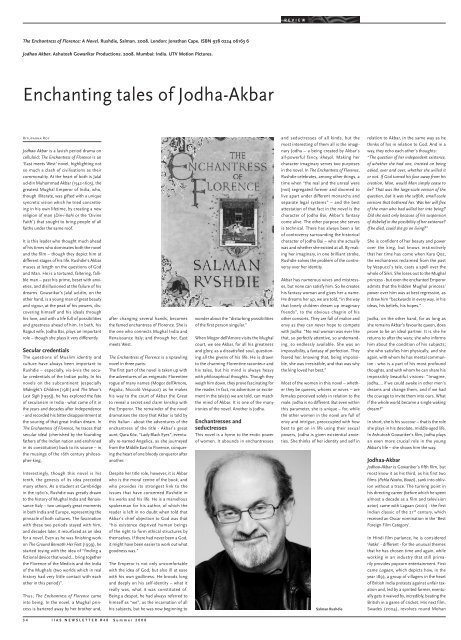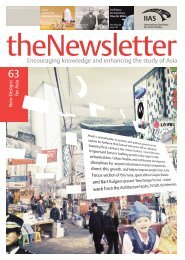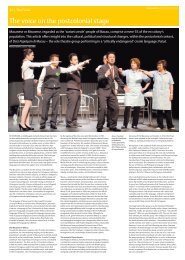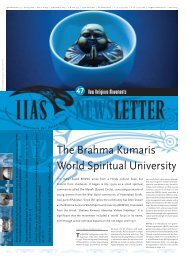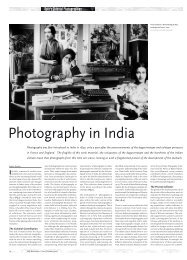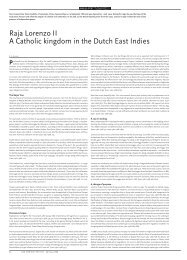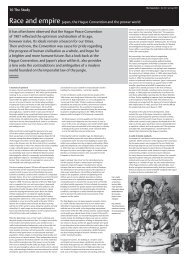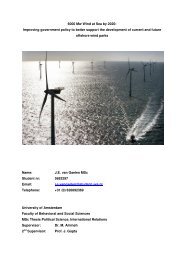Sex, love and revolution - IIAS
Sex, love and revolution - IIAS
Sex, love and revolution - IIAS
You also want an ePaper? Increase the reach of your titles
YUMPU automatically turns print PDFs into web optimized ePapers that Google loves.
R E V I E W<br />
The Enchantress of Florence: A Novel. Rushdie, Salman. 2008. London: Jonathan Cape. ISBN 978 0224 06163 6<br />
Jodhaa Akbar. Ashutosh Gowarikar Productions. 2008. Mumbai: India. UTV Motion Pictures.<br />
Enchanting tales of Jodha-Akbar<br />
Rituparna Roy<br />
Jodhaa Akbar is a lavish period drama on<br />
celluloid; The Enchantress of Florence is an<br />
‘East meets West’ novel, highlighting not<br />
so much a clash of civilisations as their<br />
commonality. At the heart of both is Jalal<br />
ud-din Muhammad Akbar (1542-1605), the<br />
greatest Mughal Emperor of India, who,<br />
though illiterate, was gifted with a unique<br />
syncretic vision which he tried concretising<br />
in his own lifetime, by creating a new<br />
religion of man (Din-i-Ilahi or the ‘Divine<br />
Faith’) that sought to bring people of all<br />
faiths under the same roof.<br />
It is this leader who thought much ahead<br />
of his times who dominates both the novel<br />
<strong>and</strong> the film – though they depict him at<br />
different stages of his life. Rushdie’s Akbar<br />
muses at length on the questions of God<br />
<strong>and</strong> Man. He is a tortured, faltering, fallible<br />
man – past his prime, beset with anxieties,<br />
<strong>and</strong> disillusioned at the failure of his<br />
dreams. Gowarikar’s Jalal ud-din, on the<br />
other h<strong>and</strong>, is a young man of great beauty<br />
<strong>and</strong> vigour, at the peak of his powers, discovering<br />
himself <strong>and</strong> his ideals through<br />
his <strong>love</strong>, <strong>and</strong> with a life full of possibilities<br />
<strong>and</strong> greatness ahead of him. In both, his<br />
Rajput wife, Jodha Bai, plays an important<br />
role – though she plays it very differently.<br />
Secular credentials<br />
The questions of Muslim identity <strong>and</strong><br />
culture have always been important to<br />
Rushdie – especially, vis-à-vis the secular<br />
credentials of the Indian polity. In his<br />
novels on the subcontinent (especially<br />
Midnight’s Children [1981] <strong>and</strong> The Moor’s<br />
Last Sigh [1995]), he has explored the fate<br />
of secularism in India - what came of it in<br />
the years <strong>and</strong> decades after Independence<br />
- <strong>and</strong> recorded his bitter disappointment at<br />
the souring of that great Indian dream. In<br />
The Enchantress of Florence, he traces that<br />
secular ideal (cherished by the founding<br />
fathers of the Indian nation <strong>and</strong> enshrined<br />
in its constitution) back to its source – in<br />
the musings of the 16th century philosopher-king.<br />
Interestingly, though this novel is his<br />
tenth, the genesis of its idea preceded<br />
many others. As a student at Cambridge<br />
in the 1960’s, Rushdie was greatly drawn<br />
to the history of Mughal India <strong>and</strong> Renaissance<br />
Italy – two uniquely great moments<br />
in both India <strong>and</strong> Europe, representing the<br />
pinnacle of both cultures. The fascination<br />
with these two periods stayed with him,<br />
<strong>and</strong> decades later, it resurfaced as an idea<br />
for a novel. Even as he was finishing work<br />
on The Ground Beneath Her Feet (1999), he<br />
started toying with the idea of “finding a<br />
fictional device that would… bring together<br />
the Florence of the Medicis <strong>and</strong> the India<br />
of the Mughals (two worlds which in real<br />
history had very little contact with each<br />
other in this period)”.<br />
Thus, The Enchantress of Florence came<br />
into being. In the novel, a Mughal princess<br />
is bartered away by her brother <strong>and</strong>,<br />
after changing several h<strong>and</strong>s, becomes<br />
the famed enchantress of Florence. She is<br />
the one who connects Mughal India <strong>and</strong><br />
Renaissance Italy; <strong>and</strong> through her, East<br />
meets West.<br />
The Enchantress of Florence is a sprawling<br />
novel in three parts:<br />
The first part of the novel is taken up with<br />
the adventures of an enigmatic Florentine<br />
rogue of many names (Mogor dell’Amore,<br />
Argalia, Niccolò Vespucci) as he makes<br />
his way to the court of Akbar the Great<br />
to reveal a secret <strong>and</strong> claim kinship with<br />
the Emperor. The remainder of the novel<br />
dramatises the story that Akbar is told by<br />
this Italian - about the adventures of the<br />
enchantress of the title - Akbar’s great<br />
aunt, Qara Köz, “Lady Black Eyes”, eventually<br />
re-named Angelica, as she journeyed<br />
from the Middle East to Florence, conquering<br />
the heart of one bloody conqueror after<br />
another.<br />
Despite her title role, however, it is Akbar<br />
who is the moral centre of the book, <strong>and</strong><br />
who provides its strongest link to the<br />
issues that have concerned Rushdie in<br />
his works <strong>and</strong> his life. He is a marvellous<br />
spokesman for his author, of which the<br />
reader is left in no doubt when told that<br />
Akbar’s chief objection to God was that<br />
“his existence deprived human beings<br />
of the right to form ethical structures by<br />
themselves. If there had never been a God,<br />
it might have been easier to work out what<br />
goodness was.”<br />
The Emperor is not only uncomfortable<br />
with the idea of God, but also ill at ease<br />
with his own godliness. He broods long<br />
<strong>and</strong> deeply on his self-identity – what it<br />
really was, what it was constituted of.<br />
Being a despot, he had always referred to<br />
himself as “we”, as the incarnation of all<br />
his subjects, but he was now beginning to<br />
wonder about the “disturbing possibilities<br />
of the first person singular.”<br />
When Mogor dell’Amore visits the Mughal<br />
court, we see Akbar, for all his greatness<br />
<strong>and</strong> glory, as a dissatisfied soul, questioning<br />
all the givens of his life. He is drawn<br />
to the charming Florentine raconteur <strong>and</strong><br />
his tales, but his mind is always heavy<br />
with philosophical thoughts. Though they<br />
weigh him down, they prove fascinating for<br />
the reader. In fact, no adventure or excitement<br />
in the tale(s) we are told, can match<br />
the mind of Akbar. It is one of the many<br />
ironies of the novel. Another is Jodha.<br />
Enchantresses <strong>and</strong><br />
seductresses<br />
This novel is a hymn to the erotic power<br />
of women. It abounds in enchantresses<br />
<strong>and</strong> seductresses of all kinds, but the<br />
most interesting of them all is the imaginary<br />
Jodha – a being created by Akbar’s<br />
all-powerful fancy, khayal. Making her<br />
character imaginary serves two purposes<br />
in the novel. In The Enchantress of Florence,<br />
Rushdie celebrates, among other things, a<br />
time when “the real <strong>and</strong> the unreal were<br />
[not] segregated forever <strong>and</strong> doomed to<br />
live apart under different monarchs <strong>and</strong><br />
separate legal systems” – <strong>and</strong> the best<br />
attestation of that fact in the novel is the<br />
character of Jodha Bai, Akbar’s fantasy<br />
come alive. The other purpose she serves<br />
is technical. There has always been a lot<br />
of controversy surrounding the historical<br />
character of Jodha Bai – who she actually<br />
was <strong>and</strong> whether she existed at all. By making<br />
her imaginary, in one brilliant stroke,<br />
Rushdie solves the problem of the controversy<br />
over her identity.<br />
Akbar has numerous wives <strong>and</strong> mistresses,<br />
but none can satisfy him. So he creates<br />
his fantasy woman <strong>and</strong> gives her a name.<br />
He dreams her up, we are told, “in the way<br />
that lonely children dream up imaginary<br />
friends”, to the obvious chagrin of his<br />
other consorts. They are full of malice <strong>and</strong><br />
envy as they can never hope to compete<br />
with Jodha: “No real woman was ever like<br />
that, so perfectly attentive, so undem<strong>and</strong>ing,<br />
so endlessly available. She was an<br />
impossibility, a fantasy of perfection. They<br />
feared her, knowing that, being impossible,<br />
she was irresistible, <strong>and</strong> that was why<br />
the king <strong>love</strong>d her best.”<br />
Most of the women in this novel – whether<br />
they be queens, whores or wives – are<br />
females perceived solely in relation to the<br />
male. Jodha is no different. But even within<br />
this parameter, she is unique – for, while<br />
the other women in the novel are full of<br />
envy <strong>and</strong> intrigue, preoccupied with how<br />
best to get on in life using their sexual<br />
powers, Jodha is given existential anxieties.<br />
She thinks of her identity <strong>and</strong> self in<br />
Salman Rushdie<br />
relation to Akbar, in the same way as he<br />
thinks of his in relation to God. And in a<br />
way, they echo each other’s thoughts:<br />
“The question of her independent existence,<br />
of whether she had one, insisted on being<br />
asked, over <strong>and</strong> over, whether she willed it<br />
or not. If God turned his face away from his<br />
creation, Man, would Man simply cease to<br />
be? That was the large-scale version of the<br />
question, but it was the selfish, small-scale<br />
versions that bothered her. Was her will free<br />
of the man who had willed her into being?<br />
Did she exist only because of his suspension<br />
of disbelief in the possibility of her existence?<br />
If he died, could she go on living?”<br />
She is confident of her beauty <strong>and</strong> power<br />
over the king, but knows instinctively<br />
that her time has come when Kara Qoz,<br />
the enchantress reclaimed from the past<br />
by Vespucci’s tale, casts a spell over the<br />
whole of Sikri. She loses out to the Mughal<br />
princess - but even the enchanted Emperor<br />
admits that the hidden Mughal princess’<br />
power over him was at best regressive, as<br />
it drew him “backwards in every way, in his<br />
ideas, his beliefs, his hopes.”<br />
Jodha, on the other h<strong>and</strong>, for as long as<br />
she remains Akbar’s favourite queen, does<br />
prove to be an ideal partner. It is she he<br />
returns to after the wars; she who informs<br />
him about the condition of his subjects;<br />
she who satisfies him physically; <strong>and</strong> she<br />
again, with whom he has mental communion<br />
- who is a part of his most profound<br />
thoughts, <strong>and</strong> with whom he can share his<br />
impossibly beautiful visions: “Imagine,<br />
Jodha…. if we could awake in other men’s<br />
dreams <strong>and</strong> change them, <strong>and</strong> if we had<br />
the courage to invite them into ours. What<br />
if the whole world became a single waking<br />
dream?”<br />
In short, she is his succour – that is the role<br />
she plays in his desolate, middle-aged life.<br />
In Ashutosh Gowariker’s film, Jodha plays<br />
an even more crucial role in the young<br />
Akbar’s life – she shows him the way.<br />
Jodhaa-Akbar<br />
Jodhaa-Akbar is Gowariker’s fifth film, but<br />
most know it as his third, as his first two<br />
films (Pehla Nasha, Baazi), sank into oblivion<br />
without a trace. The turning point in<br />
his directing career (before which he spent<br />
almost a decade as a film <strong>and</strong> television<br />
actor) came with Lagaan (2001) - the first<br />
Indian classic of the 21 st century, which<br />
received an Oscar nomination in the ‘Best<br />
Foreign Film Category’.<br />
In Hindi film parlance, he is considered<br />
‘hatke’ - different - for the unusual themes<br />
that he has chosen time <strong>and</strong> again, while<br />
working in an industry that still primarily<br />
provides popcorn entertainment. First<br />
came Lagaan, which depicts how, in the<br />
year 1893, a group of villagers in the heart<br />
of British India protests against unfair taxation<br />
<strong>and</strong>, led by a spirited farmer, eventually<br />
gets it waived by, incredibly, beating the<br />
British in a game of cricket. His next film,<br />
Swades (2004), revolves round Mohan<br />
3 4 I I A S N E W S L E T T E R # 4 8 S u m m e r 2 0 0 8


